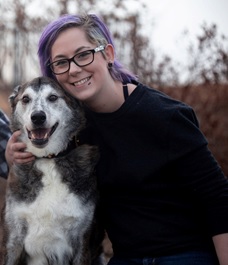What To Look For In A Dog Sitter
Although most of us would love nothing more than to spend every waking moment with our dogs, when you have to be apart it’s important to know what to look for in a dog sitter.
Imagine this: you’re heading to a family reunion, which means your go-to’s (AKA grandma and grandpa) aren’t available to dog sit, and the friends your dog knows best are all heading out of town, too. What do you do?
Enter professional pet sitters—folks who will come to your home to keep your good boy or girl company. Welcoming a stranger into your home and trusting them to care for your dog may seem like a strange concept at first, and we realize it’s not for everyone, but if you know what to look for in a dog sitter you may feel better giving it a try.
The benefits of a professional dog sitter
There is an undeniable convenience to having a trusted friend or family member look after your pet, but it’s a scenario that assumes you have access to people with the flexibility and availability to step in as needed.
Some of the benefits of hiring a professional dog sitter include:
- Reduced anxiety. Your dog may feel more at ease in your absence if they’re in an environment they’re familiar with and comfortable in.
- Sticking to a routine. Dogs thrive in routine. Major disruptions—or even a minor disruption like having to travel to a home that’s not theirs—can cause dogs to act out or withdraw. Sticking to a routine helps your dog feel loved and safe. (Don’t worry… you’ll never be replaced!)
- Less chance of infection. Staying close to home means your dog is less likely to contract dog-to-dog infections like Bordetella Bronchiseptica (or what is commonly known as kennel cough).
- Peace of mind. Professional dog sitters are precisely that: professionals. Whether your dog has a long list of daily medications or they demand (and deserve) constant pats and praise, you’ll feel better knowing your dog is receiving consistent love and attention.
- Help at home. If you’re away for an extended period of time, your dog sitter may be able to help out with tasks around the house, like watering your pet-safe plants or bringing in the mail.
How much does a dog babysitter cost?
The cost of a dog babysitter is relative to a few factors:
- Where you live
- How many dogs need care
- Whether you’d like your dog sitter to stay overnight or drop in throughout the day
- Whether additional services (things like medication administration) are required
In Canada, drop-in services tend to price around $25 for a 30-minute visit. The average dog parent requests three drop-ins per day, bringing the grand total for a dog babysitter to $75/day (plus applicable taxes).
Crystal is a professional pet sitter and the owner of I Sit Too!, a pet sitting service in Waggle Mail’s hometown of Saskatoon, Canada. Before chatting about costs, she shared what lead her to start her company:

“Years ago my beloved dog Rex—who sadly is no longer with us—did not do well in kennels. Even though he loved being around other dogs, any time he was kennelled his anxiety would get so bad he would starve himself and refuse his medications. I was sure there was a better way to give dogs in a similar situation the utmost comfort and care, and that’s when I realized: what better way than to have professional care from home?”
If you’re put off by the price point, keep in mind that professional pet sitting agencies:
- Expect dutiful care from their employees (and compensate them accordingly)
- Cover driving time and mileage (usually by the hour)
- Pay for and provide extra certification and training on things like dog first aid
- Create comprehensive manuals to help employees identify, address, and even prevent conditions like hypoglycemia
EXPERT TIP: Bonding is designed to protect and reimburse you in the rare case of a dog babysitter stealing from your home during a visit. Make sure to ask about this when scouting pet sitting agencies.
- Guarantee their services through proper licensing, insurance, and even bonding through companies like PROfur
Most agencies are transparent about what is or isn’t included in their charge (and they generally offer a courtesy consult), but you may want to ask about what, if any, costs are associated with things like:
- Walking services
- Number of feedings per day
- Administering medications
- Picking up poop
How do you find a dog sitter?
You have every right to be picky about who gets to spend time with your dog. With research and due diligence, we’re confident you’ll find a fit.
Start your search by:
- Asking for referrals. Crowdsource potential dog sitters from friends, family, colleagues, your dog’s groomer and, of course, your veterinary team.
- Reading reviews. Once you’ve come up with a shortlist, head to the web and see what others have to say.
- Checking your gut. If you’re still feeling uneasy after an initial consult, reflect on why that might be (and what you can do about it).
What to look for in a dog sitter
When you’re looking for a dog sitter, some criteria (like loving dogs) are obvious, but there are other considerations that are just as important. Some of these are things you can confirm beforehand, while others you might choose to ask during an interview:
- Does your dog sitter have a strong resume with documented experience and positive reviews?
EXPERT TIP: Check to see if your dog babysitter is certified by Pet Sitters International or other accreditation centers.
- Can they provide a recent background check?
- Do they have the proper credentials to professionally pet sit?
- How will they contact you with updates? How often?
- Do they provide all the services you’re looking for?
- Will they provide a written service agreement?
- Are they willing to do an initial meet and greet with you and your dog?
- Do they use subcontractors? (Sometimes the pet sitter you meet isn’t the same person who will be spending time in your home with your dog.)
- What happens in case of emergency? Will they contact your dog’s vet clinic, or is there another clinic they work with?
Something you can’t ask, but can certainly sense, is how your dog responds to a potential dog sitter. The quality of interaction can tell you a lot about how compatible they are and will be when you’re away.
What to do in a dog sitting emergency
First and foremost, you should always notify your veterinary clinic when your dog is under someone else’s care (friends, family, or professional dog sitter). This might seem over the top, but we firmly believe—and most veterinary professionals would agree—that you can never be too careful when it comes to your dog’s health and safety. In the event an emergency does occur and you’re not closeby, your dog sitter should be ready and able to take action to keep them safe.
Because Crystal is both a professional dog sitter and a registered veterinary technician, she brings a wealth of knowledge and experience. Crystal shared a few of her top suggestions on how to successfully navigate these kinds of stressful situations:
- Give your pet sitter’s contact information to your veterinary team. Make clear your expectations of what they are or are not authorized to do. Some clinics will have a Veterinary Release Form that can help guide this conversation.
- Set a maximum spend. This doesn’t mean you aren’t willing to go above and beyond, but pre-approving a set amount for reimbursement can prevent unnecessary delays and possible harm in cases where your pet sitter can’t immediately get ahold of you.
EXPERT TIP: Check with your dog sitter ahead of time if they’re comfortable with you sharing their contact information with your friends or family.
- Share an emergency contact. If you’re on a plane and unable to take a call, who should your dog sitter contact with questions or concerns? Does that person have an extra key to your home (just in case)? Are they authorized to make decisions on your and your dog’s behalf?
Setting your dog sitter up for success
Before your pass over your precious cargo, set your dog sitter up for success by:
- Leaving clear care instructions, including your dog’s microchip number or city license number in case they happen to get lost.
- Providing relevant and recent medical information on things like vaccine status, medical conditions, and allergies.
- Stocking up on supplies (including medications) before you go. Sometimes life doesn’t go to plan and you may be gone longer than expected.
- Sharing important house safety features like where to find your breaker panel and how to activate (or deactivate) your security system.
With all your i’s dotted and your t’s crossed, all that’s left is to enjoy your holiday and look forward to a tail-wagging reunion when you’re home (kind of like how they react when it’s #WaggleMailDay and their personalized dog subscription box shows up at the door).
Liked this post? Sign up for Waggle (e)Mail for more dog sitting tips, dog parent resources, and exclusive offers to help you take the very best care of your very best friend.

